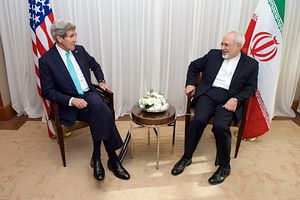Representatives from the P5+1 countries and Iran are scrambling to make some concrete progress as yet another self-imposed deadline passes. March 31 came and went without a framework deal; reports indicate the two sides remain deadlocked over how quickly sanctions would be removed and what limits would be placed on Iran’s uranium enrichment program. Talks have been extended until Wednesday, with a White House spokesman threatening to “walk away from the negotiating table” if an agreement isn’t reach “in the timeline that we’ve described.”
That would suit critics of the deal, from Israeli Prime Minister Benjamin Netanyahu to a majority of Republican Senators, just fine. In criticisms of pursuing a deal with Iran, detractors often point to a previous example of nuclear diplomacy (supposedly) gone wrong – the 1994 Agreed Framework with North Korea. Senator Tom Cotton, one of the most vocal congressional critics of the Iran talks, recently held up the North Korea deal as a cautionary tale. “It only took North Korea 12 years to get a nuclear weapon from the time we reached the Agreed Framework in 1994 to the time they tested their first weapon in 2006,” he said, inferring that a deal with Iran would be ineffective in preventing Tehran from gaining nuclear weapons.
But Washington’s chief negotiator on the Agreed Framework has a different take. Speaking at an event in Washington DC, Robert Gallucci, currently a professor in the Practice of Diplomacy at Georgetown University’s School of Foreign Service, said attempts to criticize the Iran talks by a comparison to the previous deal with North Korea are “wrong-headed.”
Despite criticisms, the “deal with North Korea worked,” Gallucci said. The deal eventually fell apart – North Korea’s secret uranium enrichment program caused the Bush administration to abandon the agreement – but the deal did have an impact on slowing North Korea’s development of nuclear weapons. Washington originally estimated that, without a deal, North Korea would be producing roughly 200 kilograms of plutonium a year by 2000 – enough for 100 nuclear weapons. Instead, by 2002, when the deal collapsed, North Korea had not acquired any additional nuclear weapons. Thanks to the Agreed Framework, North Korea “had far less plutonium … than it otherwise would have had,” Gallucci said. If the standard for a successful deal is whether or not the U.S. and its allies better off with or without a deal, the Agreed Framework meets that criteria.
In fact, Gallucci said, even the fact that North Korea was caught “cheating” on the agreement could be read positively. The “verification worked,” he said, as the U.S. was able to catch North Korea violating the deal. No one was “shocked” that North Korea cheated, Gallucci said, but Washington was confident that, under the agreement, it would “detect significant cheating in a timely fashion.”
The same approach should be applied to the Iranian nuclear talks. The standard for judging any agreement is not whether this deal is “the best deal you can imagine,” Gallucci said. The 1994 Agreed Framework was also heavily criticized, but was effective in slowing the growth of North Korea’s nuclear program.
Nor should an eventual deal be judged based on perceptions of the “character” of the regime in question. It’s “not enough to say it’s a rogue state, so I don’t want to deal with it … it can’t be trusted,” Gallucci emphasized. In fact, he argued, “trust doesn’t factor in the calculations.” Any deal with Iran should be designed to ensure transparency, allowing the P5+1 powers to monitor the situation and verify compliance. The 1994 Agreed Framework wasn’t built on trust, Gallucci said – any deal with Iran will be the same.
Instead, there’s only one criteria for approaching the talks with Iran, according to Gallucci. Are you better off with a deal than you would be if there were no deal? Without a deal, Gallucci sees two main options: Iran’s nuclear program continues to develop unchecked or the U.S. elects to use military force to halt the program. If a deal is better than either of those alternatives, then it’s in the best interests of the U.S.
Gallucci further notes that the Iranian talks could potentially be more effective than the 1994 Agreed Framework, thanks to the expanded scope of negotiations. The inclusion of the five UN Security Council members – the U.S., the U.K., France, Russia, and China – plus Germany will be valuable for keeping any agreement intact. There will be “pressure on both sides to sustain compliance,” Gallucci notes, and verification will also be improved. By the same token, he warns, if one country holds out and the other negotiating parties want a deal, it will be difficult to keep the current sanctions regime in place.

































